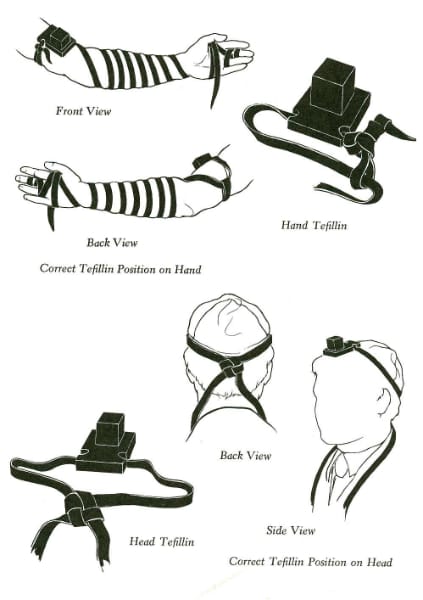The Amidah Project: Laying Tefillin--Wearing Your Prayer on Your Sleeve (Video)
Phylacteries. Except, no Jew calls them that. They're tefillin, and Jews are commanded to wrap themselves in them before morning prayer. They're a part of my morning ritual. Here's what that looks like.

This post is part of my Amidah Project series--an attempt to examine my personal experience of the core prayers of the normative Reform Jewish liturgy. For more, please browse my Amidah Project archive.
So after a couple of twists and turns, let's get this project in full swing. (Read about the genesis of this project here.) In this series of posts, my intention is to share my experience of the Jewish prayer service.
The liturgy I use is Reform, drawn from the most recent Reform siddur (payerbook) update, Mishkan T'Filah. Those unfamiliar can explore some of the siddur in various places in the worship section of the Union for Reform Judaism website. But surprisingly, given the movement's challenge of re-engaging younger and unaffiliated Jews--the URJ website does not offer a stand-alone section on prayer.
Many liberal Jews who choose to engage in davenning (prayer) do so only on Shabbat, the Jewish Sabbath. It's my personal practice to daven on weekdays, following a more traditional Jewish model which demands praying three times a day: morning; afternoon; and evening. That's the goal, anyway. Usually it ends up being morning and evening prayer. Sometimes it's just once a day. That's okay--God didn't intend for us to be perfect.
Before davenning Shacharit, the morning prayer service, I usually "lay" (that is, put on), tefillin. For a full explanation of what tefillin are and why I wear them (given that the practice is controversial in some Reform circles), see my earlier post, When a Reform Jew Lays Tefillin. But as I said in that post, I realized very quickly after the first time I wore tefillin that the practice had an amazing power to center my day and strengthen within me a feeling of connectedness to God, Judaism, and the ethical and moral goals I hope to abide by in a very literal way I could never have anticipated.
In the video below, I demonstrate how I don my tefillin and talk more about the practice. You can read a full transcript of the video, including the Hebrew and English transliteration of the initial blessing for tefillin, at the bottom of this post. I'd love to know if you lay tefillin or don't--and why. What's your reaction to or experience of what the rest of the (non-Jewish) world calls "phylacteries"? Leave a comment and let me know! And thanks for reading.
(Can't see this video in your news feed? Watch it here.)
TRANSCRIPT:
"Tefillin. I don't don them every morning when I pray. But most mornings I do. I don't say every blessing when I don them. But as with all things Reform, it's your choice to be inspired by the elements of our tradition that speak to you. That honestly speak to you in your heart and in your soul--not that you don't feel like doing something so you decide not to do it, because that's not the basis of Reform.
It felt odd maybe the first time; it feels incredibly natural now:
Baruch atah Adonai, Eloheinu, Melech haolam, asher kidshanu b'mitzvotav, v'tzivanu l'haniach tefillin.
(Blessed are you Lord, Our God, Ruler of the universe, who sanctifies us with commandments, and commands us to wrap tefillin.)
I crossed my fingers on that, because I'm actually not donning these to pray. God will forgive me. Hang on there, because there's more. I don't do the blessing for the rosh--the head--tefillin. And if you came to my house maybe most mornings, this is how you would find me. In my tefillin and davenning. On the balcony if it's warm enough or quiet enough.
Sometimes I don't daven with my tefillin. Sometimes I don't daven at all. Sometimes I do an abbreviated service for myself in the morning. Sometimes I don't do the T'filah [Judaism's central prayer], I just do the morning blessings. And sometimes it's the entire service with no choreography or standing at all at the back of a bus.
It's okay. I would think at least for me, and I bet for God, it's okay that you do something rather than nothing at all. Most of all, it's okay that you struggle with your practice. Because at least that means you're being thoughtful with your practice.
I think it's a good look."




